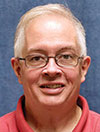Faith and Family / Sean Gallagher
Religious liberty
is a cornerstone
of the United States
 Religious liberty, which Catholics are currently celebrating through the fifth annual Fortnight for Freedom, is a cornerstone of our United States of America.
Religious liberty, which Catholics are currently celebrating through the fifth annual Fortnight for Freedom, is a cornerstone of our United States of America.
Our ancestors built upon this cornerstone to make our country a place where all the people who come to these shores may thrive, using well the gifts that God gave them to promote their own and the common good.
I pray that, at the bottom of our hearts, each of us values religious liberty for ourselves and all people. For it is through this freedom that all of us may hand on to our children, their children and those who will come after them the chance to fulfill our founders’ bright vision of liberty and brotherhood.
But from the time of the founding of our nation to the present, religious freedom has been marked by social tension. Catholics and other religious minorities in the colonies and those of later generations had their own liberties curtailed through legislation as well as broader social attitudes. Religious freedom today is more commonly looked upon with suspicion in the broader society.
Religious freedom has also been an occasion of friction within families. I know this from my own history.
My Catholic grandfather was coming of age in Johnson County in the early 1920s when the anti-Catholic Ku Klux Klan held sway in the state. He experienced the social intimidation so central to the Klan when some of its members burned a cross in a field across the road from his family’s farm.
At the same time, a great-grandfather on my mother’s side of the family was a Klan member and a representative in the Indiana General Assembly.
A generation later, my maternal grandfather, who died before my parents met, maintained an anti-Catholic attitude that had marked the Klan in the 1920s. My mom told me as I was growing up that if he had been alive when she dated my father, he would have raised serious objections to their relationship on religious grounds.
By the time my parents met in the early 1960s, though, Catholics in America had been accepted enough by the broader society that a Catholic, John F. Kennedy, was elected president.
So my parents married and my mom, raised as a nominal Presbyterian, chose to be received into the full communion of the Church. She embraced the Catholic faith, did much to raise my sister and me in it, and worked for decades as secretary for St. Joseph School in Shelbyville, which she dearly loved.
I also knew from my earliest days her respect for people who held beliefs different from her own, and how she taught my sister and me to do the same.
My wife, Cindy, and I have tried to instill this same respect in our five sons, while at the same time nurturing in them a deep love for their Catholic faith.
Maintaining both of these is a challenge in our society because it is becoming increasingly polarized and marked by a secularization which devalues any distinctiveness in faith.
As our children become adults and make their way in society, perhaps one of the greatest ways that they can build upon the cornerstone of religious freedom is to show others, through their example, that it is possible to be both a faithful believer and respectful of those who believe differently.
If more of us parents seek with the help of God’s grace to form our children to be both faith-filled and respectful of people of other beliefs, then we’ll do much to build on the legacy of religious liberty. †
 Religious liberty, which Catholics are currently celebrating through the fifth annual Fortnight for Freedom, is a cornerstone of our United States of America.
Religious liberty, which Catholics are currently celebrating through the fifth annual Fortnight for Freedom, is a cornerstone of our United States of America.